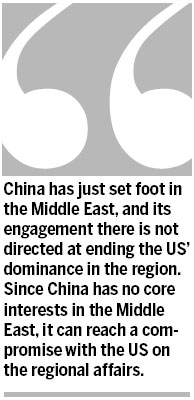China has role to play in Mideast
Updated: 2013-01-08 07:56
By Hua Liming (China Daily)
|
|||||||||||

Several major factors will affect the situation in the Middle East in the next decade. First is the eastward shift of the United States' strategic focus.
After World War II, the US invested its strategic resources heavily in the Middle East to maintain its dominant position in the region. But the shift of the world's economic and political focus to the Asia-Pacific region at the beginning of the 21st century, combined with the wars in Iraq and Afghanistan and the global financial crisis, forced Washington to change its global strategy. So it shifted its strategic focus to Asia-Pacific and curtailed its investment in the Middle East.
On assuming office in 2009, US President Barack Obama spelled out his Middle East goals as withdrawing troops from Iraq and Afghanistan, finding ways to resolve the Israeli-Palestinian conflict and devising a strategy to check Iran's nuclear ambitions.
The US is now trying to rebuild its soft power and image in the Middle East through "smart diplomacy" rather than the conventional high-investment, high-risk and high-return policy. But the Middle East is a region where multiple powers have scrambled for supremacy since ancient times.
The second factor that will influence the Middle East is the changing global energy pattern. Along with the "shale gas" revolution, the US is slowly becoming the world's major energy supplier. While the Americans are complacent about achieving "energy independence", the oil trade pattern in the Middle East is becoming distorted. Middle East countries export most of their oil and gas to and import a lot of their goods from their East Asian counterparts, and the US is becoming increasingly powerless in providing military and security guarantee in the Middle East, which could challenge the hegemony of the petrodollar.
The third factor is the transformation of the Middle East countries. The old political system in the region is breaking down, while establishing a new order is proving to be increasingly difficult. Therefore, the region's countries face a long transition, full of difficulties and reverses, during which much will depend on whether the new governments can put in place the material foundation for national development and thus achieve a power balance.
Related Stories
Syrian crisis could push Mideast into chaos 2012-12-20 08:06
Obama sends Clinton to Mideast amid Gaza crisis 2012-11-20 16:47
US cannot read runes in Mideast 2012-09-28 08:08
China may become Mideast and Africa manufacturing hub 2012-06-13 10:33
China to continue effort for Mideast peace 2012-02-23 13:58
Today's Top News
Police continue manhunt for 2nd bombing suspect
H7N9 flu transmission studied
8% growth predicted for Q2
Nuke reactor gets foreign contract
First couple on Time's list of most influential
'Green' awareness levels drop in Beijing
Palace Museum spruces up
Trading channels 'need to broaden'
Hot Topics
Lunar probe , China growth forecasts, Emission rules get tougher, China seen through 'colored lens', International board,
Editor's Picks

|

|

|

|

|

|





